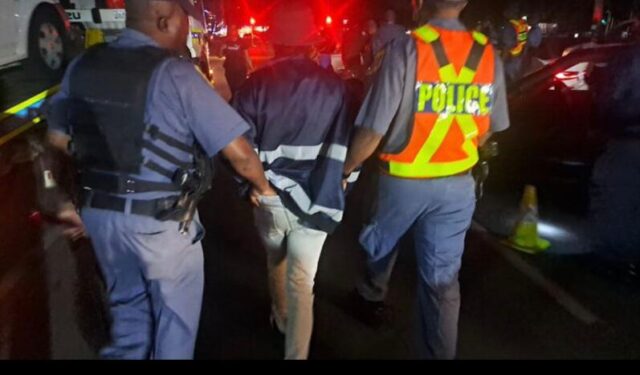Political parties, civil society and unions have expressed concern amid the crime stats report released by Police Minister Bheki Cele.
POLITICAL parties, civil society and unions have expressed concern amid the crime stats report released by Police Minister Bheki Cele.
Cele said on Friday that despite the overall drop in the country’s murder rate, between July and September this year a total of 6,945 people were murdered in South Africa.
“Out of the people killed during this reporting period, 881 were women and 293 were children. Thirty-five police officers were killed on and off duty between July and September 2023, as well as 19 law-enforcement officers attached to national, provincial and local government as well as private security,” Cele revealed.
The majority of the murders committed were listed as caused by arguments, road rage, provocation, vigilantism or mob justice.
The GOOD Party described this as another appalling report reflecting the reality of a deeply scarred and unequal country.
“Despite the marginal quarterly improvement, the murder rate went up in five provinces, including by 10.4% in the Western Cape where gang-related violence continues to claim innocent young lives and authorities, including the provincial and city governments, are pursuing strategies that are not making any meaningful impact,” said Brett Herron, GOOD Party secretary-general and MP.
Herron said there is no question that South Africa urgently needs better policing and a functioning, trustworthy justice system if any inroads in this fight are to be made.
“GOOD maintains that without addressing the toxic blend of social and economic injustice; crime cannot be reduced through more boots on the ground alone,” said Herron.
The South African Federation of Trade Unions (Saftu) said it is seriously concerned by the increase in serious crime categories from the 2nd to the 3rd quarter of 2023 as reported in the crime statistics.
Saftu said it must be noted that when compared year-on-year, murder and sexual offences decreased marginally. However, when compared quarter-on-quarter, both categories of crime increased significantly.
“Murder has increased by 717 from 6,228 in the second quarter of 2023 to 6,945 in the third quarter. On average, there are 75 people who are killed daily, an increase of seven people from the 68 that were being killed daily between April and June 2023. To these rising levels of murder, the increased shootings and stabbings in working class townships have certainly contributed immensely,” said Saftu national spokesperson Trevor Shaku.
He said illustrating the harrowing conditions of women in especially working-class communities, rape stats remained high at 10,516 reported cases, while the consolidated number of sexual offences were high at 13,090. Rape increased by a bigger margin from 1,264 compared to the second quarter of 2023. By the third quarter statistics, “it means 114 people were raped daily in this country,” Shaku said.
He said per capita ratios also paint a worrying picture.
“The SAPS reported that 17 out of every 100,000 people were raped in the second quarter; 74 out of 100,000 were assaulted in common category and 69 out 100,000 assaulted with intent to cause grievous bodily harm.
“The fact that rape, murder and other contact crimes occur at these highly disproportionate levels in this country, is indicative of the backwardness created by patriarchy in our society, and the economic deprivation created by capitalism. As a consequent, the high levels of violence have more and more permeated every sphere of our life,” he said.
Compared to quarter 2 of 2023, the small-scale economic crimes (including all types of theft, burglary, commercial crimes and shoplifting) have increased by 9,827 from a total of 194,748 to 204,575 in the third quarter. In this category, theft of and out of motor vehicles increased, together with shoplifting and commercial crimes. Cash in transit heists increased to 64.
“But the commercial crimes reported here are minor and occurs only at the micro level. The bigger economic crimes committed by capitalist bosses dressed in suits, committing them from air-conditioned offices, are unfortunately not being reported by the crime stats. These are crimes that costs this country about R400 billion in revenue collection through illicit financial flows (IFFs) annually, through tax avoidance and price transfers,” Shaku said.
He said others cost shareholders through corporate fraud such as the Steinhoff accounting fraud that have cost pension holders billions worth of investments.
“The recent example of these major economic crimes is Standard Chartered Bank that was fined by the Competition Commission for manipulating the USD/ZAR pair in the forex market between 2008 and 2013. The disappointing part, which also shows the unequal treatment of these criminals, is that the corporate elite are usually slapped with fines whilst the working class petty criminals who commit shoplifting are sentenced to jail,” Shaku said.
He added that in the South African context, where the ANC has premised fiscal policy on neo-liberal model of taxing before spending, the theft of billions of rand through IFFs costs the working class dearly. It costs them quality education, mental well-being, good health, and life generally.
Shaku said this includes those criminals in government who, week-in week-out, steal millions of rand from state coffers meant to help the poor as demonstrated in the shocking revelation of corrupt contracts in the health system, Eskom, etc.
“Though separate reports expose these crimes, the criminals committing them are never brought to justice,” he said.








